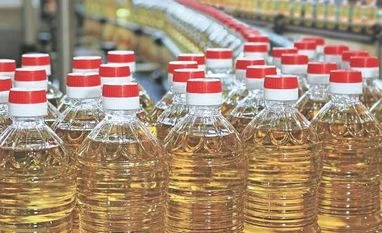With retail inflation touching nearly an eight-year high of 7.79 per cent in April 2022, the government on Tuesday exempted customs duty and the agri cess on importing 2 million tonnes of soybean and sunflower oil per year and is looking at curbing sugar exports as anti-price rise measures.
The effective duty on crude palm oil, crude soybean, and sunflower till now was 5.50 per cent, which will come down to almost zero after Tuesday’s reduction for the two oils up to a fixed quantity.
This is just after an unprecedented ban on wheat exports imposed on May 13, which has been further tightened over the week to ensure that the maximum amount of the grain stays within the country.
On sugar, sources said India for the first time in six years planned to restrict exports to around 10 million tonnes to prevent a drawdown in stocks and a surge in domestic prices.
The country, the world’s biggest sugar producer and the second-largest exporter (Brazil top exporter), has contracted around 8.5 million tonnes for sending abroad in the 2021-22 season, which started in October. Of that till May 15, around 7.1 million tonnes has been shipped (see chart).
“The limited objective of the government is that by the time the 2021-22 sugar season ends in September, India has adequate stocks to meet its three months’ consumption requirement (till December). Or else it might have to import sugar, which will be embarrassing and inflationary,” said a senior industry official aware of the move.
He said with the current estimated production of 35.5 million tonnes, which is more than the previous estimate of 31 million tonnes, the country would not have 6-6.5 million tonnes of closing stocks by September 2022 after providing for ethanol blending unless exports are capped at 10 million tonnes.
India consumes 2-2.5 million tonnes of sugar a month.
“The objective is to ensure that the country has adequate stocks at the end of the season and there is no need to import at high prices,” another official said.
He said once exports reached 9 million tonnes, up from the contracted 8.5 million tonnes, the government might call for registrations from traders so that outbound flows could be tapped.
Market participants said in the immediate aftermath of the ban, prices of sugar might soften by at best 50 paise per kg before returning to their usual levels.
The average ex-mill price of S-grade sugar is Rs 32-33 per kg while that of M-grade sugar is Rs 34-35 per kg. Shares of sugar companies like Shree Renuka Sugars tumbled by 14 per cent and Balrampur Chini Mills 10 per cent on Tuesday on the news of plans to curb exports. Sugar futures traded in London added as much as 1 per cent.
“The move is not surprising. It comes against the backdrop of rising inflation. This is in line with the Centre’s decision of limiting the export of wheat. However, it is too soon to say if this restriction will have an impact on prices in India,” said D R E Reddy, chief executive officer and managing partner, CRCL LLP.
CRCL LLP is the largest domestically managed contractual food services company in India.
Since February 2021, the government reduced the duty on edible oils six times (not including Tuesday’s cut).
Since January 2020, the landed price (Carriage, Invoice and Freight, CIF) of RBD Palmolein in India has gone up by 132 per cent, Crude Palm Oil by 135 per cent, Soya by 131 per cent and Sunflower Oil by 163 per cent, due to hike in international prices and rupee depreciation by 7 per cent in last two years.
The local prices moved in tandem with increase in CIF prices of imported oils.
Edible oil prices in India, which relies on imports for 60 per cent of its needs, have surged this year along with international prices following Russia’s invasion of Ukraine that choked the supply of sunflower oil from the Black sea region.
Added to that was concern about production levels in Malaysia, and a recent surprise move by Indonesia to temporarily ban palm oil exports, before replacing it with a domestic sales quota.
How govt, RBI moved to douse inflation
India’s consumer price inflation in April accelerated 7.79%, the fastest since May 2014. Wholesale inflation rose to 15.08%, in double digits for the 13th consecutive month. In the midst of this, the Union government and the Reserve Bank of India announced a slew of measures. There is more to come.
| Sugar exports (October to September) |
| | |
| Year | Exports (in million tonnes) |
| 2016-17 | 0.05 |
| 2017-18 | 0.46 |
| 2018-19 | 3.8 |
| 2019-20 | 5.95 |
| 2020-21 | 7.1 |
| 2021-22* | 8.5 |
| | |
| *contracted till May 15 and around 7.1 million tonnes have been shipped out of the country |
| | |
| Source: Millers |
Unlock 30+ premium stories daily hand-picked by our editors, across devices on browser and app.
Pick your 5 favourite companies, get a daily email with all news updates on them.
Full access to our intuitive epaper - clip, save, share articles from any device; newspaper archives from 2006.
Preferential invites to Business Standard events.
Curated newsletters on markets, personal finance, policy & politics, start-ups, technology, and more.
)